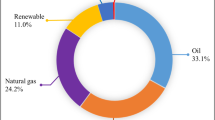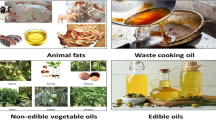Abstract
The biodiesel processor was developed for the production of biodiesel from non-edible oil of jatropha and karanj. The newly developed biodiesel processor is suitable for farmers in village level biodiesel production. The biodiesel processor was capable of producing 15 kg biodiesel per batch in 1.5 h at reaction temperature of 60°C. The biodiesel was produced from raw jatropha and karanj oil, and its blends with diesel were tested for power generation in a 7.5-kVA diesel engine generator set. The fuel properties, namely, kinematic viscosity and specific gravity, were found within the limits of Bureau of Indian Standards specifications. The overall efficiency of the generator for 4,500 W loading condition of jatropha- and karanj-biodiesel-blended fuel were recorded in the range of 21–23% and 24–27%, respectively. The overall efficiency of the generator for 6,000 W loading conditions was improved for jatropha and karanj biodiesel blends and were found in the range of 31–33% and 33–39%, respectively. Biodiesel blends B80 and pure biodiesel of karanj produced more power, and maximum overall efficiency was recorded as compared with diesel fueled generator. The overall efficiency on jatropha-biodiesel-blended fuel were found less than the diesel-fueled generator. The biodiesel processor based on alkali-catalyzed transesterification process can be used for quality biodiesel production from edible and non-edible vegetable oils. This processor can be integrated with rural energy system for domestic and small-scale industrial unit for biodiesel production.





Similar content being viewed by others
References
Anonymous (1979) Test code for agricultural tractors. BIS: 5994 (Part II)
Anonymous (2003) Performance of indian petroleum industry. Republic day special. Press Information Bureau, Govt. of India
Srivastava A, Prasad R (2000) Triglycerides based diesel fuels. Renew Sustain Energy Rev 4:111–133
Agarwal AK (2004) Biofuel as a substitute for diesel. Paper presented in National Conference on Biodiesel, CIAE, Bhopal, 3–4 December
Shay EG (1993) Diesel fuel from vegetable oils, status and opportunities. Biomass Bioenergy 4(4):227–242
Demirbas A (2003) Bio diesel fuels from vegetable oils via catalytic and non-catalytic supercritical alcohol transesterification and other methods; a survey. Energy Conserv Manag 44:2093–2109
Ma F, Clements LD, Hanna MA (1998) The effects of catalyst free fatty acids and water on transesterification of beef tallow. Trans ASAE 41:1261–1264
Foidl N, Foidl G, Sanchez M, Mittelbach M, Hackel S (1996) Jatropha curcus L., as a source for the production of biofuel in Nicaragua. Bioresour Technol 58:77–82
Author information
Authors and Affiliations
Corresponding author
Rights and permissions
About this article
Cite this article
Kalbande, S.R., More, G.R. & Nadre, R.G. Biodiesel Production from Non-edible Oils of Jatropha and Karanj for Utilization in Electrical Generator. Bioenerg. Res. 1, 170–178 (2008). https://doi.org/10.1007/s12155-008-9016-8
Received:
Accepted:
Published:
Issue Date:
DOI: https://doi.org/10.1007/s12155-008-9016-8




